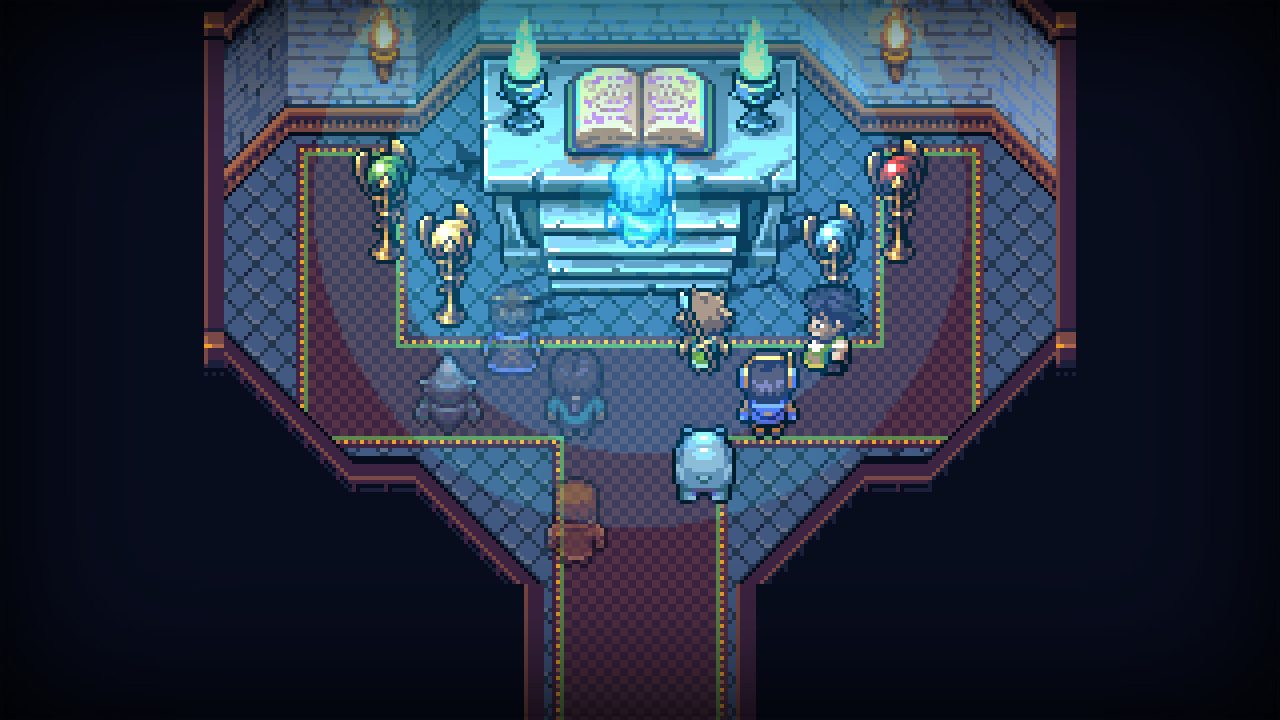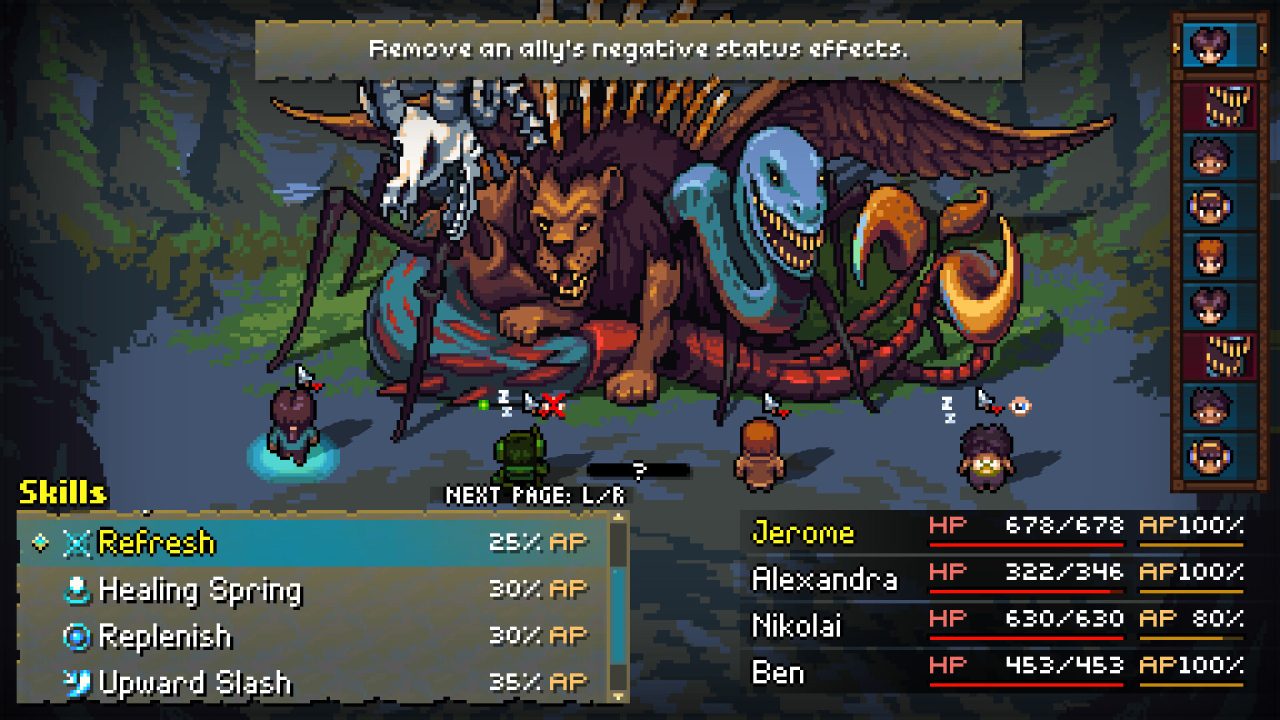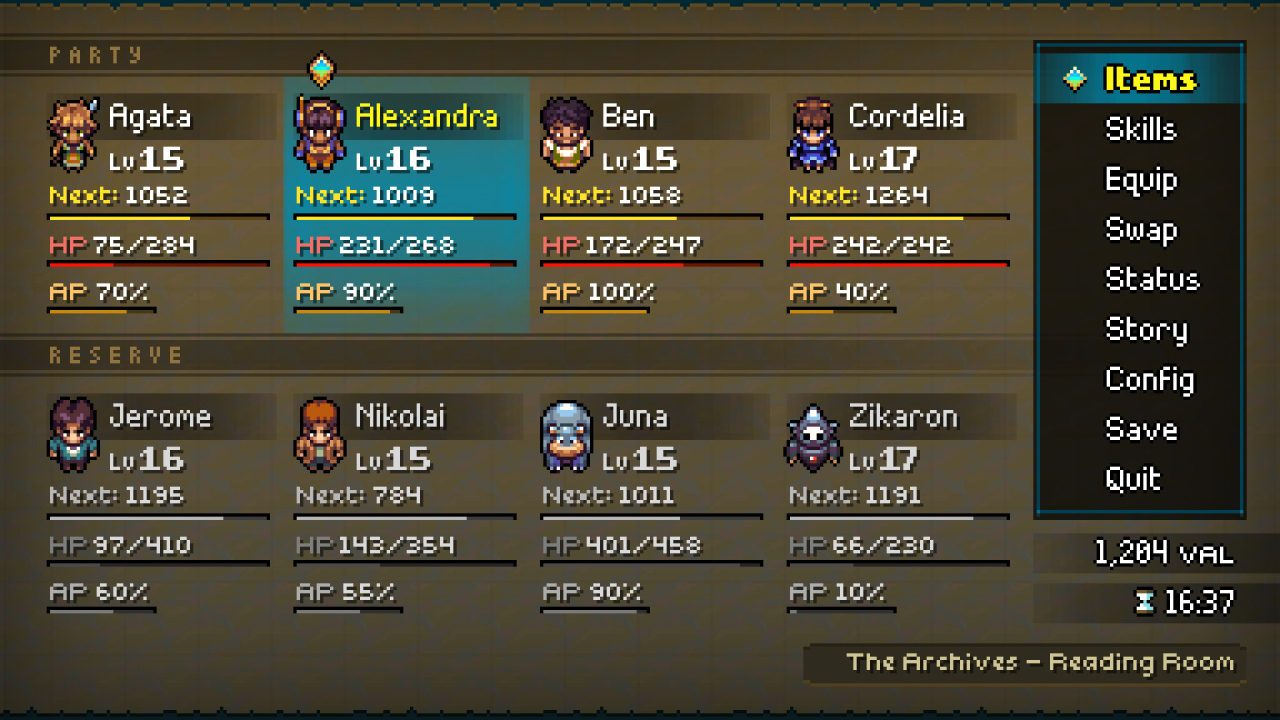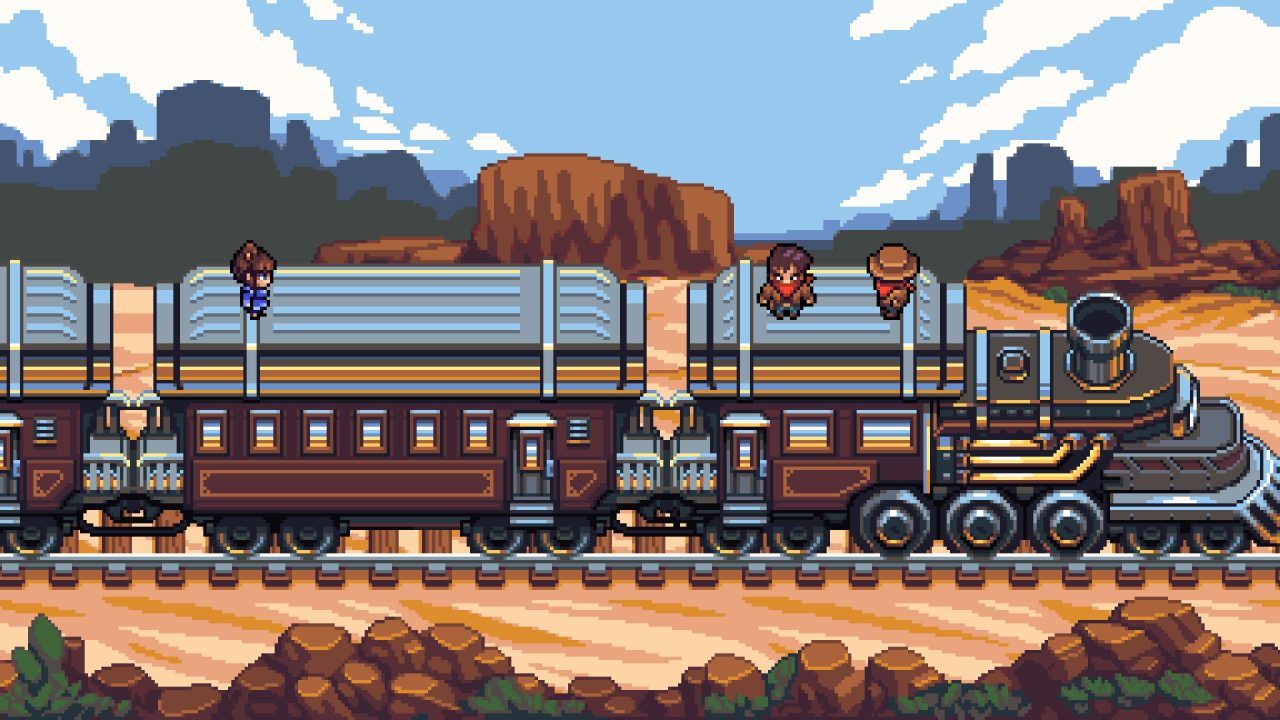Quartet is the latest RPG from Something Classic Games, the studio behind Shadows of Adam. A former colleague penned a lovely editorial about how Shadows of Adam is more than its classic-inspired veneer would suggest. Quartet is an even more ambitious title that shoots for the moon and makes it.
Quartet starts out akin to Wild ARMs, in that players choose one of four protagonists: disillusioned army sergeant Nikolai Proch, disgruntled restaurant cook Ben Balani, dedicated law school graduate Cordelia Helmont, and Alexandra Hin, a teenage shopkeeper desperately trying to keep her life from falling apart. After each of their two-to-three hour-long introductory chapters, Quartet’s middle chapters bring these characters and their traveling companions together into an eight-member fellowship for the final chapters. Every character is compelling and sure to be some RPG fan’s favorite. I only wish all eight received introductory chapters.
Quartet’s common thread is that magic is a powerful commodity everyone vies for. There are also several competing ideologies regarding magic, seeing it as both a resource and a religion—two entities that universally spark sociopolitical unrest and war. Through Quartet’s diverse protagonists, players see war affect everyone from front-line soldiers to civilians who believe themselves too far removed from it. Quartet’s story touches upon serious themes, but also has moments of levity and even some subtle comic relief. I particularly appreciated the small non-sequitur referencing Roald Dahl’s short story “Lamb to the Slaughter.”
The well-written dialogue offers insightful worldbuilding without ever going into “expository info-dump” territory. The most entertaining writing lies in the smatterings of character banter. Unfortunately, because the characters are immediately thrust into dire circumstances once they unite into a fellowship, there is not enough time for more frequent and extensive banter. For example, I wanted more than just one “cooking with Ben and Nikolai” moment, especially since Nikolai’s dad is a baker and Ben is a professional cook.
A plethora of optional late-game sidequests flesh out the characters, all of whom have unfinished business. Some of that unfinished business even uncovers new complications. Quartet also has some hidden places only found and accessed via astute airship exploration. I highly recommend exploring Quartet’s side content. Not only does it enhance character development and worldbuilding, but it can better prepare players for the final boss.
Quartet’s combat consists of traditional turn-based battles with intuitive mechanics. When the eight characters come together, four fight at one time and the other four (on standby) can be swapped in without turn penalties, while characters on standby slowly recover. Everyone earns EXP after battle, meaning nobody falls behind. Dungeons are neither too lengthy nor too brief—the only hiccup is that some open paths are obscured by tall or overhanging structures.
Some dungeons contain puzzles or mini-games to spice things up. One I distinctly remember is running through a gauntlet while avoiding gunfire, figuring out when to take cover and when to run for it. These fun little distractions are implemented well and never stopped me in my tracks. The most challenging puzzles exist in optional dungeons.
Speaking of mini-games, Quartet even has a card game called Oracle, which plays like Final Fantasy VIII’s Triple Triad. Players select five cards (each of which has numbers on all four sides) and take turns placing them on a 3×3 grid. If player 1’s card has a higher number than player 2’s card adjacent to it, that card is flipped to player 1’s color. Once the grid is filled, the player with more cards in their color wins. Quartet does not have as many card players in its world as Final Fantasy VIII does, but it’s fun to seek them out.
Quartet only has one difficulty level, best described as fun-challenging. The default hack-and-heal battle strategy longtime RPG fans utilize does not work here. Figuring out enemy weaknesses and utilizing status ailment skills (they work on bosses, too), as in Shin Megami Tensei games, is the best approach for Quartet.
Quality-of-life features, such as adjustable difficulty parameters or the option to skip puzzle sequences, are absent in Quartet. I can live without those, but the feature I truly felt the absence of is auto-save. Recovery points do not occur often in Quartet, so reminders to manually save (which can be done anywhere outside of battle) are few and far between. In addition, there were times I was going along at a great clip, too engrossed to remember to manually save, until enemy encounters party-wiped me.
Enemy encounters are visible in dungeons, occur infrequently, and do not respawn unless the party exits to the overworld. Fighting every enemy encounter ensures adequate leveling for boss battles. Do note that leveling up does not replenish HP and AP (Quartet’s equivalent of MP). In addition, the low encounter rate means that money is often tight for equipment and healing items. Ergo, resource management is important, especially during lengthy sections when characters cannot access shops to replenish healing supplies.
Quartet’s music may not impress right away, but over time its brilliance shines through. The narrative’s myriad layers peel back like an onion and the music follows suit. Hearing different styles and genres of music when visiting new locations makes them feel like unique places and not copy-paste towns. For example, the lively city of Seren has fun New Orleans-style jazz music, the hard scrapple city of Luskiya has brassy Eastern European music in a minor key, rugged frontier settlements have music befitting televised westerns, and the list goes on. Interestingly, battle and boss themes lack the punch of proverbial combat themes, but they grew on me over time, and now I cannot imagine Quartet with anything different.
Similarly to the music, Quartet’s visuals grow more attractive over time. First impressions show a vibrantly colored 2D “sprite and tile” game inspired by 16-bit classics, but the game’s real beauty lies in the small details. Sundry architectural details and thoughtful layouts make each town feel unique and as diverse as the real-world places that inspired them.
The distinctive playable character sprites stylistically represent the regions they hail from and have wonderful animations. The painstaking care put into the sprites’ various facial expressions is quite evident. The sprites themselves have that classic squat “super deformed” look on both the field and in battle. This makes the bosses loom larger and more impressively, but I would have liked to see larger or more proportional versions of the hero sprites in battle. Speaking of battles, the vivid battle backgrounds look great. A few backgrounds even animate, such as the battles that take place atop a moving train. The Chrono Trigger-style overworld has the least impressive graphics, but it looks fine and evokes the nostalgia of something classic.
My only caveat with Quartet’s visuals is that the default pixilated default font is straining to read. There are options to switch to narrow or HD fonts for better readability. I chose the HD font, which dramatically improves readability. Even the smaller text in the battle menus pop thanks to the HD font’s clarity. The menus themselves, be they field menus or battle menus, are intuitive to use and do everything an RPG fan needs them to.
Quartet not only excels with its fantastic ensemble cast, eclectic music, colorful visuals, engaging gameplay, and engrossing story, but its intangible “x factor” made my twenty-eight-hour or so jaunt a special experience. I would love to see character-centric post-ending DLC in the future, because Quartet’s cast is too cool not to revisit. I have nothing negative to say about Quartet beyond its lack of an auto-save. If this review does not put Quartet on RPG fans’ radars, then perhaps the notion of adventuring with Juna—a sage, sassy, and supportive talking hippo—will.
DISCLAIMER/NOTE: In the spirit of transparency, please note that an RPGFan staff member created this lovely art piece used on Quartet’s official site, Steam page, and social media pages. This has no bearing on the review as none of that art was used in the game.






